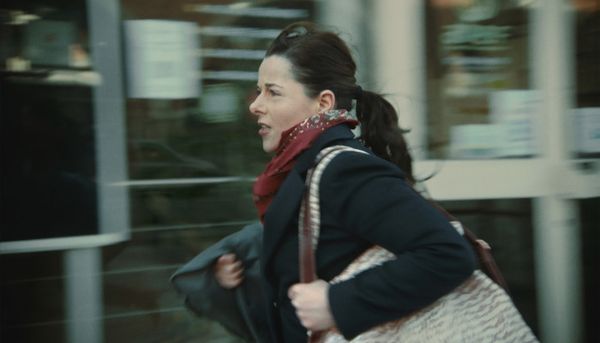Eye For Film >> Movies >> Full Time (2021) Film Review
Full Time
Reviewed by: Amber Wilkinson

We've all had one of those anxiety-induced nightmares where we find ourselves trying to get to a meeting or an important event on time when everything seems to be conspiring against us. Thankfully, we usually wake up from them but, unfortunately, for single mum Julie (Laure Calamy) this is what she gets up to almost every day. And writer/director Eric Gravel accepts no snoozing from us either, as after a moment of calm before her alarm goes off, he grabs us by the scruff of the neck and propels us into Julie's day at a speed that will barely slacken for the film's 90 minutes.
It's a daily grind of constant momentum populated by things that most people will be able to relate to, involving getting her two young children (Nolan Arizmendi and Sasha Lemaitre Cremaschi) up and ready, before dropping them at the childminder's when it is barely light and then making the trek to Paris, where she works as a chief chambermaid at a posh hotel. Her evenings play out in reverse and everything is complicated by a transport strike which is turning every journey into a lottery of replacement bus services and hitched lifts.

Julie's life is further dogged by money worries - her calls to her ex who owes her alimony permanently head to voicemail, her son's birthday is looming at the weekend with a present still to be found and she's desperate to attend interviews for a job in market research, better suited to her skill set and qualifications, but is struggling to work out how to get out of her chambermaid shifts.
Calamy plays Julie with a controlled intensity and a constant sense of momentum. Tension is there from the start in Julie's face, built from an assortment of small but persistent fears - worries about not getting the new job, about losing the current one, about losing her childminder about being a bad mum. We get the sense that there's not even time to fit an emotional response in even if she does want to have one. She may not be running physically all the time but mentally she's at the gallop.
Gravel captures not just the busyness of Julie's job as a maid but also the extreme precision required to do it, his whole film, indeed, could be considered a reminder of the toughness of jobs that often pass without notice, of nannying, of cleaning, of raising kids on your own. He also makes time for his smaller characters, such as a new chambermaid who, it turns out, also has a life that Julie had never imagined.
It's impossible not to admire and sympathise with this heroine, working the angles she is given the best she can and doing her damnedest to be all things to all people all of the time, yet quietly desperate beneath the veneer of capability. Gravel calibrates the situation well so we see that what would be minor glitches or annoyances for most people present almost full blown crises for Julie. The tension is given additional rhythm and impetus by the constantly moving electro score from Irène Drésel and often juiced by additional sound design, such as an incessant siren or the thump of windscreen wipers.
Gravel cleverly works the tempo, so we feel the occasional moments when Julie almost gets to relax, but that keep being snatched from her, more acutely, particularly in scenes with the children - a sudden kid's nightmare when she's in the bath, an unwinnable argument about pyjamas. With a pace that barely slackens and an ending that is precisely made as one of Julie's hotel beds, Gravel's film is a strong contender in Venice's Orizzonti competition, where it is premiering.
Reviewed on: 03 Sep 2021















